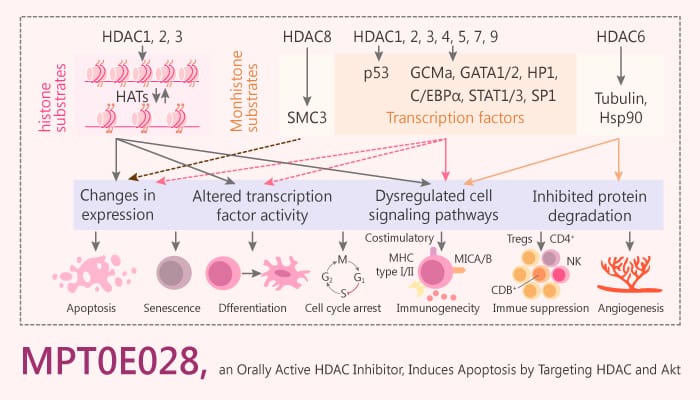HDACs are important targets for cancer therapy. Histone deacetylase (HDAC) inhibitors are a promising class of drugs for the treatment of cancers, especially subcutaneous T-cell lymphoma. In this study, Han-Lin Huang et al reported the synthesis of MPT0E028. MPT0E028 is an orally active and selective HDAC inhibitor with IC50s of 53.0 nM, 106.2 nM, 29.5 nM for HDAC1, HDAC2, and HDAC6, respectively.
MPT0E028 inhibits human colorectal cancer HCT116 cell growth. First, MPT0E028 inhibits proliferation in both solid and hematological tumor cell lines at micromolar concentrations. MPT0E028 is especially potent in HCT116 cells. Researchers examine the antitumor activities of MPT0E028 in several cancer cell lines. MPT0E028 inhibits the growth of HCT116 cells in a concentration-dependent manner using SRB assay (GI50=0.09±0.004 µM). MPT0E028 inhibits nuclear HDAC activity in the cervical adenocarcinoma cell line HeLa (IC50=11.1±2.8 nM) and in HCT116 cells (IC50=4.43±0.5 µM).

In addition, MPT0E028 has a strong apoptotic activity. MPT0E028 significantly induces HCT116 cell cytotoxicity through the apoptosis pathway. MPT0E028 also induces the sub-G1 population in a time-dependent manner. Treatment with MPT0E028 increases the number of cells in the sub-G1 phase of the cell cycle. MPT0E028 also induces caspase 3 and PARP activation in a concentration-dependent manner. MPT0E028 inhibits the growth of HCT116 tumor xenograft in a dose-dependent manner in vivo murine model. No significant body weight difference or other adverse effects are observed in MPT0E028 treated groups. In addition to HDACs inhibition, MPT0E028 also possesses potent direct Akt targeting ability.
Taken together, MPT0E028 has several properties and is potential as a promising anti-cancer therapeutic drug for the treatment of human cancers.